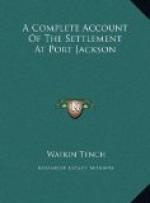At daylight we renewed our peregrination; and in an hour after we found ourselves on the banks of a river, nearly as broad as the Thames at Putney, and apparently of great depth, the current running very slowly in a northerly direction. Vast flocks of wild ducks were swimming in the stream; but after being once fired at, they grew so shy that we could not get near them a second time. Nothing is more certain than that the sound of a gun had never before been heard within many miles of this spot.
We proceeded upwards, by a slow pace, through reeds, thickets, and a thousand other obstacles, which impeded our progress, over coarse sandy ground, which had been recently inundated, though full forty feet above the present level of the river. Traces of the natives appeared at every step, sometimes in their hunting-huts, which consist of nothing more than a large piece of bark, bent in the middle, and open at both ends, exactly resembling two cards, set up to form an acute angle; sometimes in marks on trees which they had climbed; or in squirrel-traps*; or, which surprised us more, from being new, in decoys for the purpose of ensnaring birds. These are formed of underwood and reeds, long and narrow, shaped like a mound raised over a grave; with a small aperture at one end for admission of the prey; and a grate made of sticks at the other: the bird enters at the aperture, seeing before him the light of the grate, between the bars of which, he vainly endeavours to thrust himself, until taken. Most of these decoys were full of feathers, chiefly those of quails, which shewed their utility. We also met with two old damaged canoes hauled up on the beach, which differed in no wise from those found on the sea coast.
[A squirrel-trap is a cavity of considerable depth, formed by art, in the body of a tree. When the Indians in their hunting parties set fire to the surrounding country (which is a very common custom) the squirrels, opossums, and other animals, who live in trees, flee for refuge into these holes, whence they are easily dislodged and taken. The natives always pitch on a part of a tree for this purpose, which has been perforated by a worm, which indicates that the wood is in an unsound state, and will readily yield to their efforts. If the rudeness and imperfection of the tools with which they work be considered, it must be confessed to be an operation of great toil and difficulty.]
Having remained out three days, we returned to our quarters at Rose-hill, with the pleasing intelligence of our discovery. The country we had passed through we found tolerably plain, and little encumbered with underwood, except near the river side. It is entirely covered with the same sorts of trees as grow near Sydney; and in some places grass springs up luxuriantly; other places are quite bare of it. The soil is various: in many parts a stiff and clay, covered with small pebbles; in other places, of a soft loamy nature: but invariably, in every part near the river, it is a coarse sterile sand. Our observations on it (particularly mine, from carrying the compass by which we steered) were not so numerous as might have been wished. But, certainly, if the qualities of it be such as to deserve future cultivation, no impediment of surface, but that of cutting down and burning the trees, exists, to prevent its being tilled.




